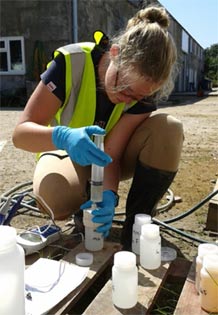
CSM student Felicia Gatenby taking water samples for analysis at the Camborne School of Mines for her dissertation on the effectiveness of NeutraSeal for the treatment of acid mine waters.
New water-powered plant halves the cost of treating mine water
A new low energy mine water treatment plant promises a 50% reduction in the electricity costs of treating mine water. The plant has been built and tested at an abandoned tin mine in Cornwall by the University of Exeter’s Camborne School of Mines and Minus Engineering.
Water in mines is carefully managed to prevent the release of contaminated water into the environment. NeutraSeal - the groundbreaking technology used in the new plant – can handle high volumes of water and remove a wide range of contaminants, including manganese and sulphate, which have the potential to contaminate drinking water supplies.
The plant has a modular, scalable design that reduces capital costs by 30% compared to conventional systems. The technology harnesses a static head of water to replace pumping costs and introduces optimised neutralisation and aeration processes.
The sealed nature of the system increases its reliability in extreme environments, and valuable metals can be recovered from suitable waters to provide a revenue stream.
Dr Ben Williamson from Camborne School of Mines said: “Not only does this new water treatment technique offer lower operational costs because of reduced electricity use; it also offers lower initial capital costs. These cost savings, along with the opportunity to generate additional revenue from recovered metals, are sure to be of interest to the mining industry and we are now investigating routes for commercialisation.”
Interested parties from within the mining sector are invited to see a demonstration of the energy and water treatment performance of the pilot plant.
Dr Williamson and Terrie Sawyer from Camborne School of Mines worked with Minus Engineering to pioneer and test the plant at Mount Wellington Mine in Cornwall.
The project was funded by UK innovation agency the Technology Strategy Board.
Date: 30 October 2013
